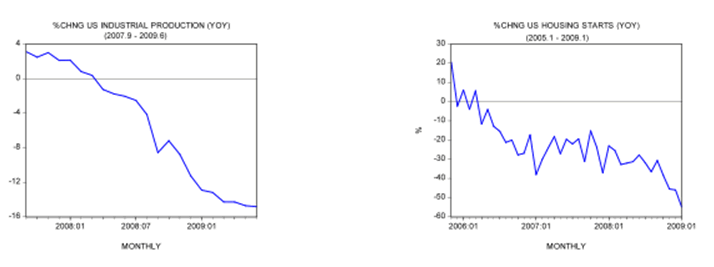
Posted on 04/22/2012 11:06:22 AM PDT by blam
Did Bernanke Prevent Another Great Depression?
Politics / US Economy
April 22, 2012 - 07:02 AM
By: Frank Shostak
In a lecture given at George Washington University on March 27, 2012, the chairman of the Fed said that the US central bank's aggressive response to the 2007–2009 financial crisis and recession helped prevent a worldwide catastrophe. Various economic indicators were showing ominous signs at the time. After closing at 3.1 percent in September 2007, the yearly rate of growth of industrial production fell to minus 14.8 percent by June 2009. The yearly rate of growth of housing starts fell from 20.5 percent in January 2005 to minus 54.8 percent in January 2009.

Also, retail sales came under severe pressure — year on year, the rate of growth fell from 5.2 percent in November 2007 to minus 11.5 percent by August 2008. The unemployment rate jumped from 4.4 percent in March 2007 to 10 percent by October 2009. During this period, the number of unemployed people increased from 13.389 million to 15.421 million — an increase of 2.032 million.
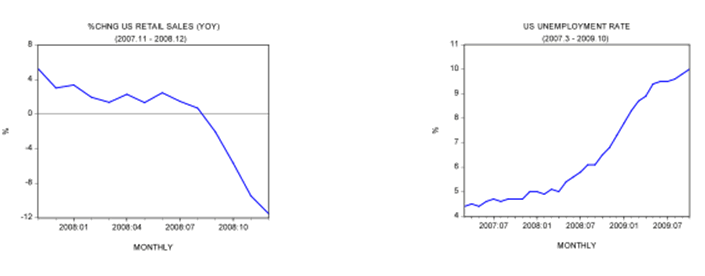
In response to the collapse of the key economic data and a fear of a financial meltdown, the US central bank aggressively pumped money into the banking system. As a result, the Federal Reserve balance sheet jumped from $0.884 trillion in February 2008 to $2.247 trillion in December 2008. The yearly rate of growth of the balance sheet climbed from 1.5 percent in February 2008 to 152.8 percent by December of that year. Additionally the Fed aggressively lowered the federal-funds rate target from 5.25 percent in August 2007 to almost nil by December 2008.
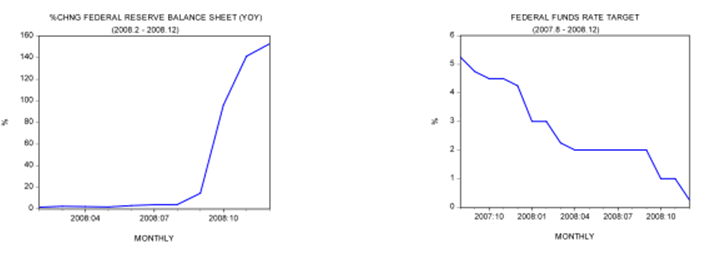
Despite this pumping, the growth momentum of commercial-bank lending had been declining with the yearly rate of growth falling from 11.9 percent in January 2007 to minus 5.3 percent by November 2009. As a result of the fall in the growth momentum of lending, the growth momentum of the money supply would have followed suit if not for the Fed's aggressive pumping to the commercial paper market. This pushed the yearly rate of growth of our measure of US money supply from 1.5 percent in April 2008 to 14.3 percent by August 2009.
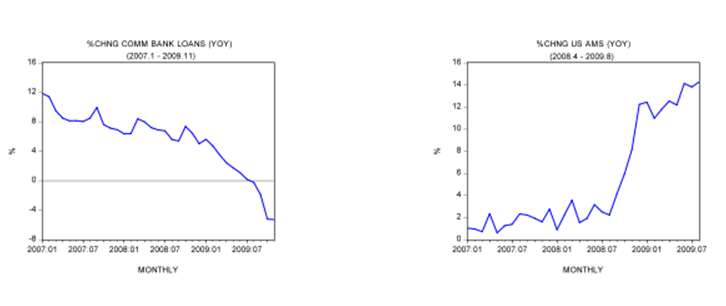
In his speech Bernanke blamed reckless lending in the housing market and financial engineering for the economic crisis. He also acknowledged that the supervision by the Fed was inadequate. According to Bernanke, once the crises emerged the Fed had to act aggressively in order to prevent the crisis from developing into a serious economic disaster. The Fed chairman holds that a highly accommodative monetary policy helps support economic recovery and employment.
We hold that various reckless activities in the housing market couldn't have emerged without the Fed's previous reckless policies. After closing at 6.5 percent in December 2000, the federal-funds rate target was lowered to 1 percent by May 2004. The yearly rate of growth of our monetary measure, AMS, jumped from minus 0.9 percent in December 2000 to 11.5 percent by December 2001. In short, the strong increase in the growth momentum of money supply coupled with an aggressive lowering of interest rates set the platform for various bubble activities, or an economic boom.
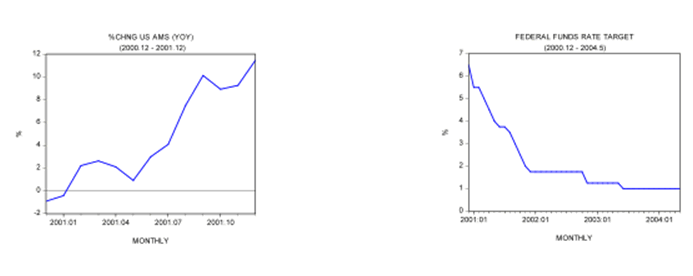
A reversal of the Fed's loose stance put an end to the false boom and put pressure on various bubble activities. The federal-funds-rate target was lifted from 1 percent in May 2004 to 5.25 percent by June 2006. The yearly rate of growth of AMS plunged from 11.5 percent in December 2001 to 0.6 percent in May 2007. As it happened, the effect of this tightening was felt in the housing market first before it spilled over to other bubble sectors. (A tighter monetary stance slowed down the diversion of real savings toward bubble activities from wealth-generating activities.)
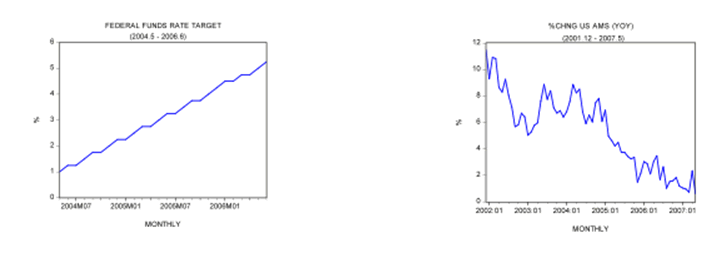
Contrary to Bernanke, we suggest that his loose monetary policy of August 2007 didn't save the US economy but saved various bubble activities that had come under pressure from the previous tighter monetary stance.
Note the loose monetary stance has been aggressively diverting real funding from wealth generators towards bubble activities, thereby weakening the wealth-generation process. The only reason why loose monetary policy supposedly "revived" the economy is because there are still enough wealth generators to support the Fed's reckless policy. Also, note that all the gains from the previous tighter stance have now been wasted to support bubble activities.
As long as the pool of real savings is still growing, Fed policy makers can get away with the illusion that they have saved the US and the world economies. Once the pool of real savings starts stagnating, or worse, declining, the illusory nature of the Fed's policy will be revealed — note that the economy follows the state of the pool of real savings. Any aggressive monetary policy in this case is going to make things much worse.
The actions of Bernanke to revive the economy run contrary to the basic principles of running a company. For instance, in a company of 10 departments, 8 departments are making profits and the other 2 losses. A responsible CEO will shut down or restructure the 2 departments that make losses — failing to do so will divert funding from wealth generators toward loss-making departments, thus weakening the foundation of the entire company. Without the removal or restructuring of the loss-making departments, there is the risk that the entire company could eventually go belly up. So why then should a CEO who decides to support nonprofitable activities be regarded as a failure when Bernanke and his central-bank colleagues are seen as heroes who saved the economy?
Bernanke is of the view that by pumping money he has provided the necessary liquidity to keep the financial system going. We suggest that this is false. What permits the financial sector to push ahead is real savings. The financial sector does not have a life of its own; its only role is to facilitate the real wealth that was generated by the wealth producers. Remember that banks are just intermediaries; they facilitate real savings across the economy by means of money (the medium of exchange).
By flooding the banking system with money, one doesn't create more real savings but, on the contrary, depletes the pool of real funding. Most commentators are of the view that in some cases when there is a threat of serious damage to the financial system the central bank should intervene to prevent the calamity, and this is precisely what Bernanke's Fed did.
We suggest the severe threat here is to various bubble activities that must be removed in order to allow wealth generators to get on with the job of creating wealth. If a lot of bubbles must disappear, so be it. Any policy to support bubbles, be it large banks or other institutions, will only make things much worse. As we have seen, if the pool of real savings is not there, a central-bank policy to prop up bubbles will make things much worse. After all, the Fed cannot generate real wealth.
Bernanke's policy — which amounts to the protection of inefficiency, i.e., bubble activities — runs the risk of generating a prolonged slump with occasional rallies in the data. It could be something similar to the situation in Japan (which Bernanke has in the past criticized).
Summary and Conclusion
We can conclude that, contrary to Bernanke, his loose policies didn't save the US economy from a depression but have instead damaged the process of real wealth generation.
Bernanke's loose policies have provided support to bubble activities, thereby destabilizing the economy. So in this sense his policies have saved the bubbles, thus undermining wealth generators.
We suggest that the more forceful the Fed's response to various economic indicators is, the more damage this does to the pool of real savings. This runs the risk that at some stage the United States could end up having a stagnating or worse, declining, pool of real savings.
If this were to occur, then we could end up of having a severe economic slump. If anyone needs examples in this regard, have a look at countries such as Greece, Spain, and Portugal.
Over a prolonged period of time the policies of these countries (an ever-growing government and central-bank involvement in the economy) have severely damaged the heart of economic growth — the pool of real savings.
Again, if the pool of real savings is to become stagnant, or worse, starts declining, any attempt by the Fed to make things better is going to make things actually much worse by depleting the pool of real savings or funding further. If the pool of real funding is stagnating, then no matter how much pumping the Fed does, banks will not be able to lift lending. Remember: without expanding real funding any expansion in credit could lead to financial disaster.
We would never have been at risk for one had Hussein not made a series of bizarre comments between the election and his inaguration.
Which comments in particular? TY in advance. : )
This economist thinks Bernanke may well have. Bernanke certainly followed the advice of Milton Friedman concerning what the FED should have been doing 1930-33.
Here’s a sample: http://www.mlive.com/businessreview/annarbor/index.ssf/2009/02/we_should_not_and_will_not_pro.html
Have fun searching for more; they’re out there.
Im not an economist, but am an MBA student. I pretty much agree with this article. You don’t lend money to broke people and expect it to end well..
Question: If you were advising the Federal Reserve, what would you say are the unsolved economic problems of the day?
Milton Friedman: The one unsolved economic problem of the day is how to get rid of the Federal Reserve. – January 1996 interview on NPR
That stupid ass Bernanke didn't prevent a thing. He merely postponed the inevitable by increasing the problem, and in so doing made the outcome much worse.
I did not read the article but the conclusion. When did Bernanke lend money to broke people?
Bernake didn’t. Lenders did.
Agree.
That stupid ass Bernanke didn't prevent a thing. He merely postponed the inevitable by increasing the problem, and in so doing made the outcome much worse. Agree big time!
He merely kicked the can down the road. We will soon see first hand what an economic collapse and a civil war (think France not America) look like.
What triggered the 1929 mess and the 2008 mess are two entirely different issues.
I would agree that when you allowed people to walk in and get home loans...with only $1k down, and regular people were paying $1500 a month on their mortgage...it was wrong. I would agree that when you bought a house at $200k and five years later, it was valued at $280k...it was wrong. I would agree that bundling these mortgages into investment packages and selling them to mutual funds and foreign banks....was totally wrong.
There are an awful lot of experts (even from Harvard) who kept us on this trail for a good fifteen years...going continually toward the mess. No senator or congressman ever challenged any of this stupidity in doing common banking business or mortgages.
O please! He saved us from the staged crisis... Gee thanks. There is no way the september 07 bank run just happened. They created a crisis and call themselves savior... Sickening.

This economist thinks Bernanke may well have. Bernanke certainly followed the advice of Milton Friedman concerning what the FED should have been doing 1930-33 ...
... and that is exactly why this country is in such bad shape economically! Bernanke was fighting the wrong war!
[Our current economic problems] are not due to a lack of money available to lend, but to a lack of faith in the ability of borrowers to repay their debts. The Fed has gone about as if the problem is a shortage of liquidity. That is not the basic problem. The basic problem for the markets is [uncertainty] that balance sheets are credible. -- Anna Schwartz, Our central bankers and our Treasury Department are getting it wrong again, The Wall Street Journal October 18, 2008
Note: Anna Schwartz co-authored, with Milton Friedman, A Monetary History of the United States (1963), the definitive account of how misguided monetary policy turned the stock-market crash of 1929 into the Great Depression.
Right, so what is Bernanke to do? The charge of the FED is to maintain a stable price level. How has done on that? From 1930 to 1933, the price level declined by about 25%. From 2008 to 2012 the price level has risen about 6%.
Providing a stable price framework for the operation of the economy is what the FED can do. Anything else is the FED trying to do more than they are capable of and that is destabilizing.
I agree with everything you said. This whole “crisis” was created by the ‘RATS to get somebody named Obama in the White House. JMO.

Add this (by yours, truly) to your list:
Are you TAXED ENOUGH ALREADY,
Or still have your last dime?
Do you need to keep on giving
Until you are poor, weak and blind?
Do you feel good as the parasites
Destroy what you have built?
Does it warm your heart to witness
That the poor refuse to work?
Ah, the joy of working to go in debt
To DC’s Company Store,
And with each election the politicians say,
“We must tax you until YOU are also poor.”
Lol!!!
I also believe the BP oil spill was sabotaged to CREATE THE EXCUSE to rally the American people 'against oil' so as to enable the socialists to steer America away from 'capitalist-driven' oil (IMPLEMENT THE CHANGE). The socialist's intent here was to crush free-market, capitalist oil and replace it with government run 'green programs'. This is a major sector of our economy stolen from Americans and placed into the hands of the globalists.
The THEFT of just two industries; The health care industry and conventional oil industry from the private sector represent a major victory of the socialist movement in the United States.
Watch out for events created solely for the purpose of generating the EXCUSE the government needs to IMPLEMENT THE CHANGE.
I don't believe such nonsense.
Disclaimer: Opinions posted on Free Republic are those of the individual posters and do not necessarily represent the opinion of Free Republic or its management. All materials posted herein are protected by copyright law and the exemption for fair use of copyrighted works.